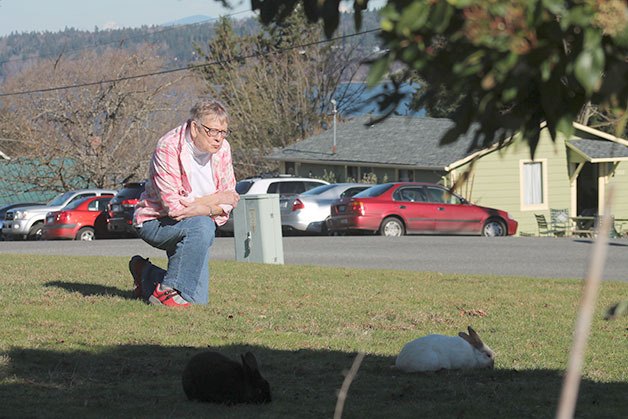Worried that a mass culling or relocation of Langley’s abundant rabbit population would be wildly unpopular, Mayor Fred McCarthy has decided to let the bunnies be.
Despite fielding several complaints about the booming bunny population in Langley, the city will not hire a trapper or authorize the slaying of rabbits under McCarthy’s governance.
“I don’t think we’re going to get into the business of trapping and euthanizing rabbits,” McCarthy said. “I don’t think that would go over well in Langley.”
Residents are split on their opinions of the furry critters. Some have taken to feeding and sheltering the big-eared bunnies, which in Langley are largely a combination of semi-wild/feral rabbits or hares and non-native eastern cottontail rabbits, according to Russell Link with the Washington Department of Fish and Wildlife.
Other Langley folk, such as Fran Johnson, are fed up with losing their gardens and landscaping to the voracious herbivores. At her home, a recently landscaped slope in her backyard is pockmarked with holes dug by rabbits scrounging up young plants. Johnson pointed out several shrubs and trees, many of them well withered when they should be leafy or covered in needles, that she will have to replace. She estimated the damage to be around $300, nearly half of the cost to have the whole area landscaped last year.
“I’m not going to plant anything,” Johnson said. “It’s a waste of money. They come in and eat everything right to the ground.”
Out in her front yard, she points out a circle planter that is just beauty bark, dirt and a stone bird bath. Once it was filled with vegetation, even a corner for cabbage, which unsurprisingly did not survive a bunny’s appetite.
“I had some stuff in there,” she said. “Now it’s gone.”
Some residents expressed fears about coyotes preying on the rabbits in Langley, which would eventually move on to household pets. A request on The Record’s Facebook page for any stories of losing pets to coyotes or noticing an increase in coyotes was met with little comment other than request to leave the bunnies alone.
Dave Marks, Langley’s police chief, said he has not responded to any calls about coyotes attacking pets. He did notice an anecdotal increase in sightings, saying he spotted one in December near the Langley fire station, even taking video of it.
“They are pretty good size,” Marks said of his coyote sightings. “But I don’t know how you prove that they’re coming into town because of the rabbits or not. There have always been coyotes around.”
“Cats do vanish quite a bit, but it’s hard to say if it’s raccoons or eagles,” he added.
Rabbits became such a nuisance for one resident that he ended up shooting them with an air-powered gun. That led to a citation by the Langley Police Department and a criminal charge, Marks confirmed, because it violated the ban on discharging a firearm in city limits.
Trapping and hunting rabbits is a more complicated series of rules. According to the Department of Fish and Wildlife’s website, “Living With Wildlife,” the best way to sort it out is to contact a local wildlife office for the most recent legal status and restrictions. Three species — Nuttall’s cottontail rabbit, Eastern cottontail rabbit and snowshoe hare — are classified as game and require a hunting license and an open season.
Domestic rabbits, the kind most often spotted in Langley, are unclassified and may be trapped or killed year-round without a permit. Trapping device restrictions still apply.
But just because it’s legal, doesn’t mean it will be popular, and that includes Langley police.
“I’m not into killing animals for no reason,” Marks said.



